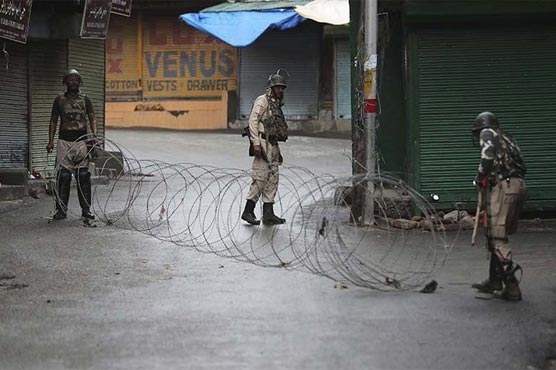Military clampdown by India continues on 143rd day in occupied Kashmir

Military clampdown by India continues on 143rd day in occupied Kashmir.
SRINAGAR (Web Desk) – In occupied Kashmir, there is no change in the situation on ground particularly in the Kashmir Valley and Muslim majority areas of Jammu region as military lockdown entered 143rd straight day on Wednesday (today), Kashmir Media Service reported.
Indian authorities lead the world when it comes to cutting the internet, which New Delhi snapped on August 5 when it scrapped the region’s special status. People have been offline since then, queuing for hours to pay bills or using so-called “internet kiosks”, set up by the authorities in some areas.
As protests rage inside India, it’s something people outside the Himalayan region are also getting a taste of. Internet, prepaid phone and text messaging services remain suspended since August 5.
Meanwhile, hit hard by the nearly five-month lockdown in the wake of abrogation of Article 370, Valley traders are seeking waiver of interest on bank loans. The traders say they need incentives from to revive their businesses.
“Overall, the business activities in Kashmir have always been affected but we suffered huge losses after August 5. Traders had taken loans and are now struggling to revive their businesses,” Kashmir Economic Alliance (KEA) Vice- Cairman Aijaz Shahdhar said in a statement in Srinagar.
He said a conducive atmosphere is must for the revival of trade as traders are suffering losses due to the suspension of Internet services. “Other factors, like the frequent closure of Srinagar-Jammu highway and suspension of air traffic, are other roadblocks in smooth flow of trade.
Unfortunately, Internet continues to remain off even now,” Shahdhar deplored.
Ghulam Hassan Mir, President of Jammu and Kashmir Democratic Party (Nationalist), questioning New Delhi over indiscriminate use of the draconian law, Public Safety Act has said that the law was to be used in the rarest of rare cases against criminals and certainly not against political leaders and activists.
He lamented what was supposed to be an exception has been made a rule, adding this is not only unfortunate but also undemocratic because it amounts to a culture of intimidation and harassing the voices of dissent.

